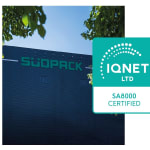
Social responsibility along the entire value chain including the observance of human rights is fundamental to Südpack - and is firmly anchored as a central pillar of its corporate strategy. Although the German Act on Corporate Due Diligence Obligations in Supply Chains will first apply to the family business starting on January 1, 2024, Südpack has already implemented the new legis-lation, compiled a declaration of principles on respecting human rights and simultaneously completed extensive SA8000 certification in August 2023.
On January 1, 2023, the first phase of the Act on Corporate Due Diligence Obli-gations in Supply Chains came into force for companies with more than 3,000 employees. The act regulates corporate due diligence obligations with regard to the respect of human rights in global supply chains, which includes protect-ing children from exploitation through work, the right to fair wages and pro-tecting the environment. As of January 1, 2024, it will also be obligatory for the Südpack Group since it has more than 1,000 employees.
The SA8000 Standard is an internationally recognized certification standard that was initiated by Social Accountability International, a non-governmental organi-zation located in New York. The certification is performed voluntarily and fo-cuses on social responsibility in the workplace. It is based on the United Na-tions’ Universal Declaration of Human Rights, the International Labor Organiza-tion (ILO) Conventions and other international human rights standards as well as the labor rights that are anchored in national labor laws. In August 2023, Südpack became one of the few companies of its to successfully com-plete the extensive certification program.
“With the Act on Corporate Due Diligence and SA8000 certification, we are demonstrating due diligence towards our employees, customers, suppliers and society as a whole – and in doing so, clearly substantiate our high standards regarding sustainability and social responsibility,” elaborated Carolin Grim-bacher, Managing Partner of the Südpack Group.

An overview of measures at Südpack
In recent months, the internationally operating film manufacturer analyzed the risks in its supply chain in terms of a sustainable supply chain and fair working conditions. Direct suppliers were examined based on their industry and coun-try risks to identify real and potential risks to human rights and the environ-ment in the supply chain in order to implement the appropriate measures for prevention and minimization. In addition and particularly for suppliers at a high risk regarding these issues, an assessment was performed both in-house and externally with the EcoVadis scorecard. “With regular reporting as well as the examination and updating of risk analyses, we are able to monitor the effec-tiveness of measures well and, most importantly, continually develop,” high-lighted Lisa-Marie Schmidberger, who as Project Manager at Südpack is also responsible for sustainability reporting.
At the same time, the training opportunities that involve social topics have been significantly expanded in order to raise employee awareness of corpo-rate principles and values. For Carolin Grimbacher, the working conditions of key suppliers in particular are “a mirror of our own values that we would like to be sure of in our company group – and that we will continue to update in our sustainability reports. It is in this sense that we set particularly high standards.”
At Südpack, a compliance agent, a compliance committee and a social perfor-mance team make sure that all of the applicable compliance rules are known, that they are complied with along the entire supply chain and that ultimately breaches and the resulting risks are minimized.
Moreover, the implementation of complaint mechanisms and a whistleblower system provide different ways for employees, suppliers and all other relevant stakeholders to report incidents regarding risks to and violations of human rights and the environment.



